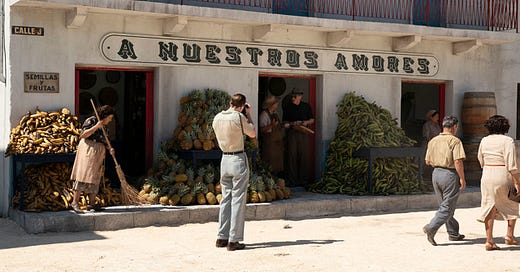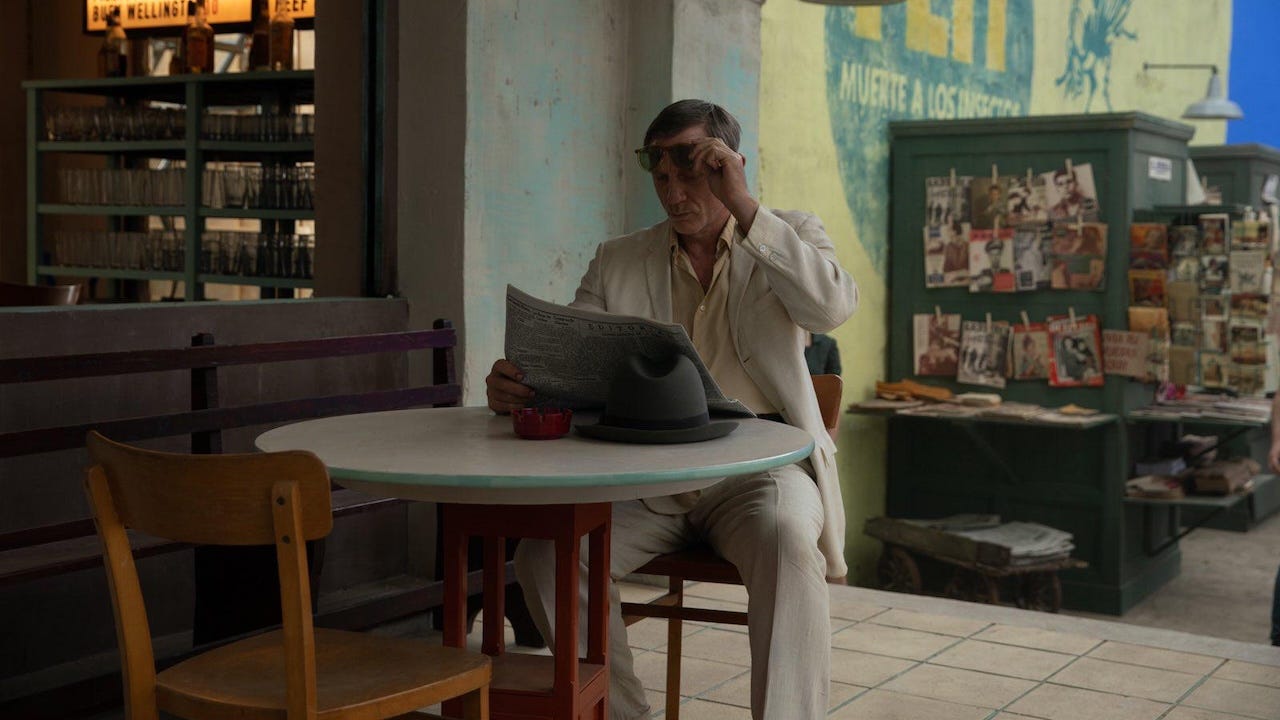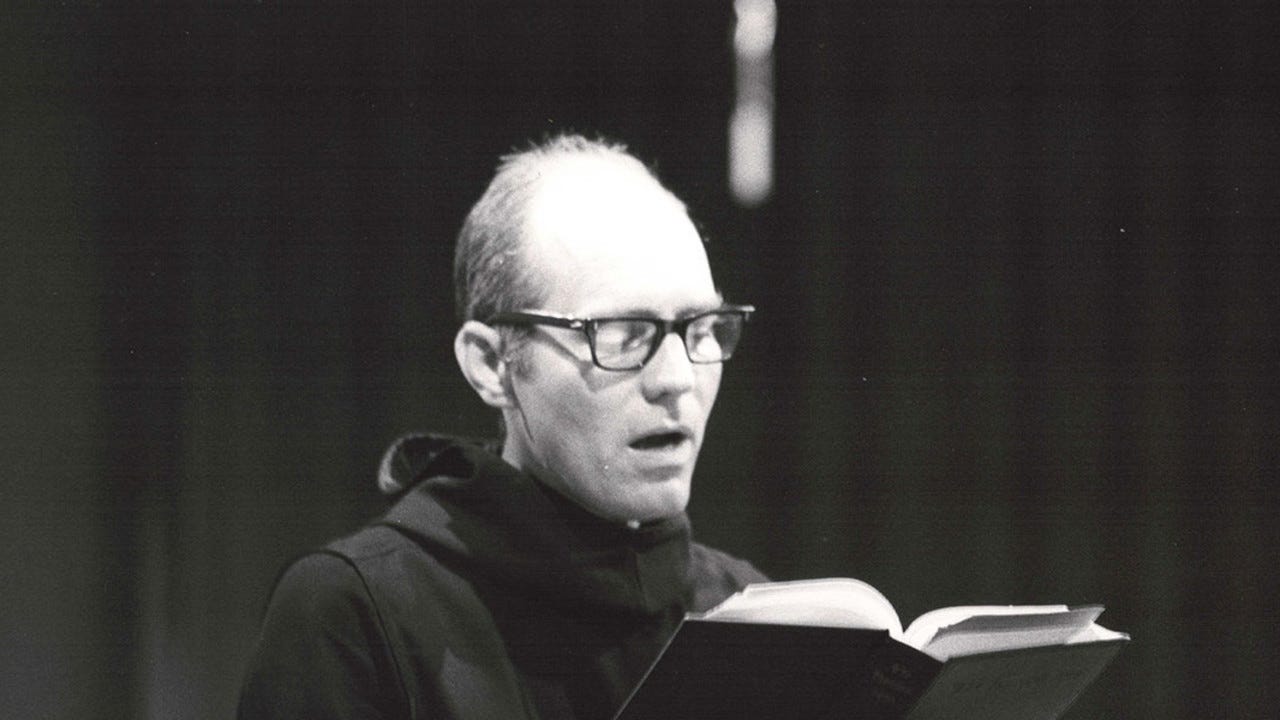After once again mainlining another six movies in one day, Day Six at TIFF was my opportunity to take it easy. I suppose I could have been up and out the door early to see Emilia Pérez, but I’m wary of it, and I had work to do in the morning anyway. I only finally rolled out for an 11:35 am press screening, and then caught one of the restorations being presented at the festival, and that was my day… of moviegoing at least.
I haven’t been terribly social this TIFF. Sociable, perhaps. I have been bumping into people at various screenings, chatting with friends both from Toronto and in from out of town, plenty of catching up, but I haven’t been going out of my way. That’s no reflection on other people, they’re all wonderful, but the idea of setting up little dates between or in place of movies just hasn’t appealed, and I haven’t had any particular itch to attend parties or hangouts or what have you. I find myself in an odd place, happy enough to tend to my frienships and acquaintances, but still feeling a desire for some measure of solitude among the swarms of people in darkned theatres. That may explain why I’ve been seeing so many movies most days. It’s easier to just sit with myself for 90 minutes or more. As hectic summer transitions into fall, TIFF, as hard as I’ve been going, is my break.
On Tuesday night, though, I kept things light, at last attending a party in the evening. One I knew would be populated by people I like, and people I haven’t met who I was sure I’d like as well. No shmoozing, just kind of a fancier hangout, and it was great being in good company. There’s a funny thing about art, about movies. The experience is often an isolating one. Even with all the talk about sharing in the magic of movies in a theatre with other people, the direct experience of art is shared by no one but the person and their own mind, and heart. These personal expressions flickering before us exist as dual relationship between the artist, usually absent, and each audience member. It’s only afterward, in the coming together (at a party, say) that the sphere expands. Art becomes a point of connection, and it’s the connection that’s important. What else is culture for if not sharing? So we got together last night, and we talked about what we’d been seeing, and we talked about work, and we talked about other things (with the Harris/Trump debate going on, talk of the state of the world inevitably arose), and it felt good to share in that.
Before that night out, though, I did see a couple films, as mentioned. The first of which was Luca Guadagnino’s Queer, an adaptation of the William S. Burroughs novel, which I haven’t read, starring Daniel Craig. It’s Guadagnino’s second film of the year, after Challengers, and exists as a clear departure despite carrying many of the same collaborators. Trent Reznor and Atticus Ross are back with a new score, less dominating and exciting than their work on Challengers, but equally excellent. Cinematographer Sayombhu Mukdeeprom is back as well, this being his fourth film of the year (he also shot Trap and sections of Grand Tour, here at the festival, and quite a picture), and it’s perhaps the most beautiful of them all. The film’s period setting, in Mexico and South America, brings out such lavishness of colour and lighting, combined with visual effects plates for the backgrounds that resemble gorgeous matte paintings of old. This is a film of style, such style. Jonathan Anderson, who also worked on Challengers, returns as costume designer, and the outfits are so gorgeous as to almost overshadow the rest of the film’s sumptuous offerings. And the rest here is great, too. Craig’s heightened but emotionally raw performance of a man yearning for an openness he can never acquire is by turns funny and devastating. Guadagnino plays with surreal imagery, fitting the Latin American setting, that is occasionally too showy, but also features things I simply have never seen onscreen before. It’s a hot movie, both very sexy and also just dripping with sweat at all times. It’s got a great supporting cast, including Drew Starkey as the object of Craig’s affections, and a delightful turn from a pudgy Jason Schwartzman. More than anything, it’s a film of mood, working slowly, but with specificity (Guadagnino is a master of insert shots, punctuating moments and elucidating intentions), and I suspect its reception will be a lot less rapturous than Challengers, though it may be the better film. Maybe not. I’m still working that out, it’s very good at least. Either way, it’s quite an achievement on the director’s part, not to mention his other big Challengers collaborator: writer Justin Kuritzkes. What a year for that guy!
After Queer, I had a bit of time in between and used it mostly to mill about, bumping into some people, but mostly killing time before one of my most anticipated screenings of the festival: the world premiere of the 4K restoration of Frederick Wiseman’s 1972 documentary Essene, about life in an American Benedictine monastery. Not so much a film About Religion, it is instead about making a life within a set of contradictions. The world of the Church, its demanding rules and order, conflicting with the reality of individuals forming community in a modern and rapidly modernizing time. I’ve always had a strong pull, despite my atheism, toward films about religious life. The commitment to faith, to belief, intrigues me as a human being always in search of meaning. In Essene, there are the expected appeals to faith in God and Jesus of course, but Wiseman presents those as nothing more or less than the state of being for the monks. Religion, in effect, is merely context. What it brings out, through the intellectual explorations these men make into their faith and brotherhood, is a vision of love that exists beyond the petty day-to-day. Monks living together for years, decades, many of them drawn to the monastic life in the light of personal traumas and an often frightening world, learning constantly to live with themselves and each other. To love, to attempt to love, even when one doesn’t like another, is the most pure expression of good human spirit. A sequence toward the end, in which one of the brothers bears his soul before his brethren and others in attendance, displays such depth of love I was moved to tears. It may be unfair to the rest of the festival’s entries, but Essene might be the best thing I’ll see here. I consider myself lucky having once spent some brief time with Wiseman, interviewing him, one of those moments in my life I’ll forever cherish. We should all count ourselves lucky to live in a world where Wiseman’s films exist.







A "just as excellent" score from Reznor and Ross?
Shit must be a BANGER.
Fromtheyardtothearthouse.substack.com